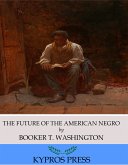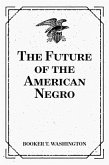In 'The Future of the American Negro', Booker T. Washington crafts a profound exploration of the socio-economic conditions and challenges faced by African Americans at the turn of the 20th century. With a prescient gaze into what the future holds, Washington outlines his vision for racial uplift through education and entrepreneurship. His advocacy for practical skills over political agitation is presented in a literary style that is engaging, persuasive, and underpinned by his own ethos of self-help and determination. Undoubtedly, the work is a seminal piece within the African American literary tradition, navigating the post-Reconstruction era's complexity with a blend of cautious optimism and strategic foresight. Booker T. Washington's personal trajectory-emerging from slavery to become an educator and the foremost black leader of his time-informs the substance of this text. His position as the founder and principal of the Tuskegee Institute allowed Washington a unique vantage point from which to opine on race relations and black advancement. His pragmatic approach to these issues reflects his belief in the potential of African Americans to achieve economic progress and societal integration through self-reliance and hard work. This philosophy made him a contentious figure, both revered and criticized within various circles. Scholars, educators, historians, and readers interested in the African American experience will find 'The Future of the American Negro' to be an indispensable resource. Washington's cogent analysis offers timeless insights into the intersection of race, economics, and education in America. His book not only captures the zeitgeist of a nation grappling with the aftereffects of slavery but also presents enduring lessons on the resilience and agency of a community determined to forge its path forward. This republished edition from DigiCat ensures that Washington's influential voice continues to resonate with contemporary audiences seeking to understand the past in order to better navigate the present and future.
Dieser Download kann aus rechtlichen Gründen nur mit Rechnungsadresse in A, B, BG, CY, CZ, D, DK, EW, E, FIN, F, GR, H, IRL, I, LT, L, LR, M, NL, PL, P, R, S, SLO, SK ausgeliefert werden.









